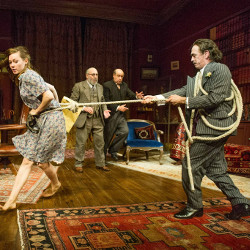Michael Coveney: Critics and Freud descend on theatrical Hampstead

The critics, as well as Sigmund Freud, returned to Hampstead last night with the revival of Terry Johnson's delightful Hysteria – both a cracking farce and a first-rate play, not always the same thing – with Antony Sher's bearded psychoanalyst occupying a reproduction of the Freud Museum around the corner in Maresfield Gardens.
As is my wont, I walked to the theatre from my house 20 minutes away, having just taken delivery of the local free sheet, the excellent Camden New Journal, and noticed a piece therein by Heather Neill, secretary of the Critics' Circle Drama Section, flagging up the Critics' Circle conference in two weeks' time.
That all-day conference on Friday 27 September, convened to celebrate the centenary of the Critics’ Circle (which coincided with the sinking of the Titanic), will be held in Hampstead, too, right across the road from the theatre in the Central School of Speech and Drama (which I see has lately, off-puttingly, saddled itself with a "Royal" in its title). Registration is free, but you must register (criticsday@gmail.com or here), and "join the conversation" as they say with the likes of Lyn Gardner, Fiona Mountford, Libby Purves, Nicholas de Jongh, Matt Trueman, Mark Shenton and myself. Actor Michael Simkins, who lives locally, will be telling us how much he appreciates our words of wisdom and how much he enjoys reading other people’s bad reviews (John Gielgud once said of reading Kenneth Tynan, “It’s wonderful when it isn’t you”).
The subject is the history of criticism and what happens next as we all twitter, blog and review online and the print media goes down the chute, basically. How does this upheaval maintain the standards of criticism (presuming for a moment that we have any) and does it matter anyway if critics are mown down in the rush to express opinions whether invited or not to do so? Is there a critical consensus on anything, and would it be healthier if there were not? Does anyone care? And who do critics themselves think they are writing or blogging for? Each other? The great unwashed?
It's interesting, as Heather says in her article, that Nica Burns, the producer who is also addressing the conference, has said that she thinks it important that "our culture is given the exposure it deserves, and it is important that it is written about and commentated on by people who really know what they are doing." Does she include members of the Critics’ Circle in that group, I wonder? What kind of critic would she like to see in the future?
Most producers tend to go sulky on us when we hand them disobliging notices because all they are really interested in, bottom line, is making a profit, and only favourable reviews help that cause. I hope the conference manages to underline the "higher purpose" of criticism as something that both serves the market place but maintains a serious (and, above all, entertaining) public discussion around the art form. Critical feedback is good for the industry, but critics primarily write for the general public and, of course, themselves. I can't wait to know what I think when I sit down to write a review.
I've lately been critical of Hampstead Theatre in dismantling its educational department and using its basement studio as a try-out venue which confusingly both invites and discourages critics from reviewing, but it was still slightly ungracious and childish of executive producer Greg Ripley-Duggan to shake me by the hand last night with more than a hint of a sneer.
At the time, before the start of Hysteria, I was listening to playwright Joe Penhall telling me about the new musical he's developing with director Ed Hall and the great Ray Davies of the Kinks, as well as Roger Michell filling me in on his new movie, Le Week-End, starring Jim Broadbent and Lindsay Duncan, and written by Hanif Kureishi, which is opening here soon after scoring a big success at the Toronto Film Festival.
Others in the first night throng included Michael Frayn, Mike Leigh, Marion Bailey (soon to open in Moira Buffini's Handbagged at the Tricycle in Kilburn), board member Tim Pigott-Smith, Tracy-Ann Oberman (next up in Deborah Bruce's Godchild, directed by Michael Attenborough in the aforesaid downstairs try-out space) and Anna Maxwell Martin.
My heart always sinks when I see Anna in a foyer because it means she probably won't be appearing in the ensuing play. Hey-ho. Antony Sher and Adrian Schiller weren't leaving much room on the stage last night for anyone else anyway, though Lydia Wilson and David Horovitch somehow managed to hold their own.
A colleague mentioned yesterday morning's Radio 4 programme about Oh! What a Lovely War, presented by Simon Russell Beale, which I'd forgotten to listen to. So of course I rushed straight home to catch it on BBC iPlayer. The story of the show was wonderfully well evoked by "army brat" SRB, talking to original cast member (and Theatre Royal, Stratford East, archivist) Murray Melvin, as well as Charles Chilton (shortly before he died last year, aged 96), the BBC radio programme maker whose The Long, Long Trail documentary was Joan Littlewood's template for the show.
Another, more unlikely, source for OWALW was the Conservative politician Alan Clark's book Donkeys, about the stupidity of the war generals – scenes were allegedly lifted whole from this by Littlewood, and Clark instigated legal action – though that stupidity is now diluted somewhat in the revisionist accounts of the battles and strategies by subsequent historians.
The main point was that the show still had a lot to say in the present climate, and we shall see for ourselves when none other than Terry Johnson (good choice) directs the fiftieth anniversary production at Stratford East next March. Joan's old company manager, Kevin Palmer, now retired in Australia, has emailed me to say that he's already booked his tickets.










